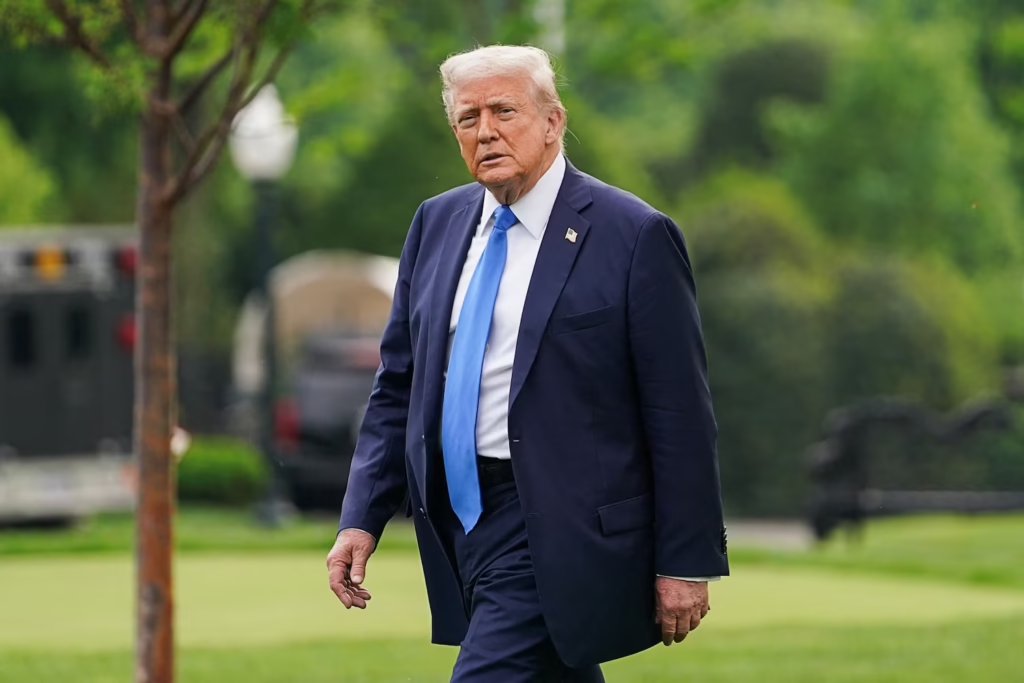In a move that has raised eyebrows both within and outside political circles, the Trump administration is preparing to accept a stunning gift from the royal family of Qatar—a luxurious Boeing 747-8 jumbo jet. Set to become the new Air Force One for President Donald Trump until his departure from office, the gift is nothing short of extraordinary, and its value is estimated at $400 million without additional modifications. The Boeing 747-8, referred to as “a flying palace,” will undergo significant upgrades to meet the specifications required for the U.S. president’s travel, marking a pivotal moment in both aviation and diplomatic history.
This groundbreaking decision comes amid heightened scrutiny of the Trump administration’s dealings, particularly concerning its financial and political ramifications. As Trump prepares to accept this unprecedented gift, questions are mounting about the legality and ethics of accepting such a valuable donation from a foreign government. The plane, which will be used exclusively by President Trump, is set to be transferred to the Trump Presidential Library Foundation after his tenure, a move that has raised concerns about possible violations of the U.S. Constitution, specifically the emoluments clause prohibiting foreign governments from bestowing gifts upon U.S. officials.
Sources close to the matter have confirmed that the announcement regarding this gift will likely be made during Trump’s upcoming visit to Qatar. The high-profile foreign trip will serve as a backdrop for the formal acceptance of the Boeing 747-8, which will replace the aging Air Force One fleet. Currently, the U.S. Air Force uses two Boeing 747-200 jets, both operational since 1990, which have long been in need of replacement.
The 13-year-old aircraft, which will be retrofitted to meet the U.S. military’s needs, had previously been used by the Qatari royal family. However, the plane is now set to undergo significant modifications by the U.S. Air Force. While the jet’s original value is pegged at $400 million, experts estimate that the additional costs to meet military specifications—especially to secure the aircraft for presidential use—could push the total worth of the plane even higher. The plane will eventually be transferred to the Trump Presidential Library Foundation, a move that has left many questioning whether such an arrangement might constitute an unethical or illegal act.
Legal experts within the White House have provided assurances that this highly unusual arrangement is legally sound. A legal memorandum drafted by White House counsel, along with a report from the Department of Justice, confirms that the transfer of the plane from Qatar to the U.S. government, and subsequently to the Trump library, does not constitute a violation of U.S. law. Specifically, the memorandum addresses concerns over the emoluments clause, concluding that the plane is being gifted to the U.S. Air Force and not to President Trump personally, thus avoiding any potential conflicts.
The key legal arguments hinge on the idea that the aircraft is being accepted by the U.S. government, and once retrofitted for presidential use, it will be transferred to the Trump Library Foundation, which is not directly tied to Trump’s personal financial interests. This legal maneuver, which was initially seen as contentious, has now been approved by both White House counsel and the Department of Justice.
Despite these assurances, however, critics continue to voice concerns about the optics of such a gift, particularly given its high value and the close ties between the Qatari royal family and the Trump administration. Some worry that the arrangement could be seen as a form of political influence peddling, though the Trump administration has vigorously denied any improper intent or dealings.
The Boeing 747-8 has been described as a “flying palace” due to its lavish interiors and cutting-edge technology, making it the ideal choice for the new Air Force One. President Trump had long been vocal about his frustration with the delays in the replacement of the aging Air Force One fleet, which has been plagued by cost overruns and setbacks since the original contract was signed in 2018. With the delivery date for the new planes now pushed to 2027, well beyond Trump’s planned departure from office in 2025, this unexpected donation from Qatar provides an immediate solution to the president’s long-standing concerns over his transportation.
The Trump administration has expressed frustration with the delays in the production of the new Air Force One planes, leading Trump to take matters into his own hands. In an unusual move, Trump enlisted the help of Tesla CEO Elon Musk to speed up the production of the new planes. Musk’s involvement was aimed at streamlining the delivery process, and while it has resulted in some improvements, the planes are still not expected to be ready until 2027.
To address this issue more immediately, the Qataris stepped in with an offer that, while controversial, promises to deliver the luxury aircraft Trump desires without the usual bureaucratic delays associated with military contracts. The fact that this high-profile gift is linked to Qatar—one of the U.S.’s most important allies in the Middle East—adds another layer of complexity to the situation, particularly regarding the optics of the donation.
As the controversy surrounding the Boeing 747-8 continues to unfold, both supporters and detractors of the arrangement have weighed in. Supporters argue that the decision to accept the aircraft is a pragmatic solution to the long-standing delays in the replacement of Air Force One, providing an immediate remedy for the president’s transportation needs. Critics, however, remain concerned about the potential legal implications and the message such a gesture sends about the relationship between foreign governments and U.S. political leaders.
For now, the Trump administration is moving forward with its plans, with the Air Force preparing to make the necessary modifications to the Boeing 747-8 to meet presidential standards. The plane is expected to be operational for President Trump before the end of the year, assuming all modifications are completed on schedule.
In the meantime, the U.S. government has agreed to cover the cost of retrofitting the aircraft, with the final price tag expected to be significantly higher than the initial valuation of the jet. While critics remain wary of the ethical questions surrounding the gift, the Trump administration is confident that the legal basis for accepting the donation is solid.
Ultimately, this unprecedented decision to accept a luxury aircraft as a gift from a foreign government may set a new precedent for how the U.S. handles high-value donations from foreign powers. As the situation continues to develop, it will likely spark further debates about the intersection of politics, diplomacy, and the ethical implications of accepting such lavish gifts from foreign governments.
As the plane undergoes the necessary modifications and is prepared for use, the Trump administration will continue to face scrutiny over this decision. Only time will tell whether this unprecedented gift will ultimately be remembered as a pragmatic solution to a long-standing problem or a symbol of political influence and controversy.


